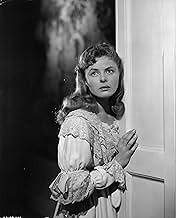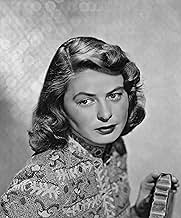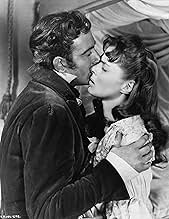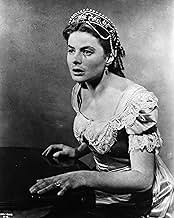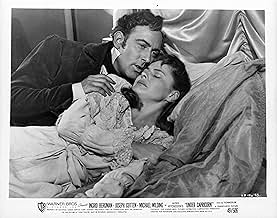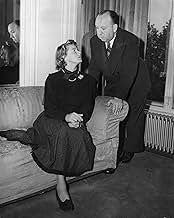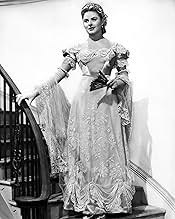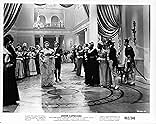अपनी भाषा में प्लॉट जोड़ेंA young gentleman goes to Australia where he reunites with his now married childhood sweetheart, only to find out she has become an alcoholic and harbors dark secrets.A young gentleman goes to Australia where he reunites with his now married childhood sweetheart, only to find out she has become an alcoholic and harbors dark secrets.A young gentleman goes to Australia where he reunites with his now married childhood sweetheart, only to find out she has become an alcoholic and harbors dark secrets.
- पुरस्कार
- कुल 3 जीत
- Major Wilkins
- (as Francis de Wolff)
फ़ीचर्ड समीक्षाएं
There's little fault to be found with the settings, which are convincing enough. Some of the characters never really come to life, but there is still an interesting mix of them. The pace is one area that definitely could have been improved, and the pre-occupation with the long takes certainly doesn't help at all. The technique worked very well in Hitchcock's "Rope", because it meshed with the setting and the subject matter. It doesn't fit so well here in "Under Capricorn", and it often dilutes the suspense rather than increasing it.
By no means is it a total clinker - the story does have some interesting parts, and with a different approach it could have been suspenseful, even memorable. Hitchcock's technical skill is still present in many respects, and even Hitchcock's lesser achievements are still worth seeing.
The movie's overly-polished feel is consistent with the approach that was chosen. It's at least one case where the more familiar, less affected Hitchcock style would have resulted in a much better film.
Joseph Cotton was appealing, even though his character throughout much of the movie seemed to be villainous, and his reasons for being that way were quite apparent by the end of the film. My suspension of disbelief centered around Bergman's casting as an Irish aristocrat: once in awhile she managed to say a word that had an Irish flavor, but mostly she just sounded Swedish. However, that did not detract at all from her usual thoughtful performance. Michael Wilding irritated me a little with his foppish ways, yet even he managed to come off as a human being with faults and virtues...just like the rest of us. Leighton was superb and she, like Cotton, seemed to be a treacherous yet sympathetic character. I think it was the portrayals of complicated people with no one being painted as totally good or bad, the nuanced characterizations that I found so artistic yet real.
If you approach this movie without preconceptions, you might be drawn into it and appreciate Hitchcock's genius in an entirely different way.
1831: Irishman Charles Adare arrives in Australia to make his fortune, and soon hooks up with Sam Flusky, a wealthy landowner with a shady past and a business proposition. Ignoring the orders of his cousin, a local Governor, Charles continues to associate with Flusky and his alcoholic wife Henrietta, who was a friend of Charles' sister many years ago back in Ireland.
The long takes the film is composed of are often masterful. Whereas his previous film Rope felt like a gimmicky experiment (albeit a successful one), here the technique is perfected, and actually serves a purpose. It widens the scope to allow the actors room to deliver fine performances, and to exploit the lavish sets. It also serves to narrow the scope, either to focus attention or withhold crucial information until the last moment (it's especially effective at these two). This focusing/concealing also adds to the sense of Bergman's isolation and entrapment in her environment, and allows for some of the film's best shots.
I'm not a fan of Jack Cardiff, but his colour cinematography is considerably less jarring here than in his Powell-Pressburger outings, and although it does take a while to adjust the eyes, it's perfectly suited to the mood and setting.
Ingrid Bergman delivers what I consider to be her best performance. Henrietta is frail and very vulnerable - a pathetic creature. Yet the strength and dignity that she once possessed is glimpsed at the outset, and gradually comes to the fore without ever completely displacing that vulnerability.
Joseph Cotten likewise does an excellent job. His crippling inferiority complex dictates everything he does, and it's where the film gleans much of its drama. In his own way he's equally as pathetic as Henrietta; trapped in a different kind of mental prison. Sometimes he's unaware of his cruelty, believing himself to be doing the right thing; at others it's as if he can't help himself. He's a man who constantly tries to do good things, yet at every turn he's thwarted either by his own secret past, or his fear of that past. For a man so ostensibly powerful he's easy to knock down, and his reaction to these setbacks just reinforces his own negative perception of himself. This conflict is written on his every gesture and expression.
Michael Wilding's performance as Charles is less technically brilliant, but as the carefree, opportunistic cad who sees in Henrietta the chance to do an act of great kindness he's wonderful. There is great humanity in all three leads, but it's most overt and infectious in Wilding.
I leave the debate over whether this is Hitchcock's worst film to those that debate such things and try to list everything comparing apples and potatoes seemingly for the sake of it. As surprising as it may be, I'm not one of those but I can understand why this film has been labelled such by others because it is surprisingly run-of-the-mill for that great director. The story is soapy etc on the surface but it had great dark potential with so many threads and emotions floating around. It is surprising then that none of them are made more of and the film just sticks with the genre by becoming nothing more than an acceptable period melodrama. There is still just about enough about it to make you remember that this was from Hitchcock but I was disappointed by how straight-down-the-line it actually was in the end. The direction is still good though, with nice camera movements and shots, and the sets are colourful enough to fit the genre (if not the spirit of birthing Australia).
The cast try hard but nobody can lift the material all by themselves. To his credit, Cotton tries hard with a brooding and dark performance but he can't do it alone. Bergman is good and could have done wonders with a much more complex character, in the end what she has to deliver is nothing special and just melodrama. I didn't care for Wilding; his performance wasn't up to much and I dn't think he eld his own that well alongside Cotton and Bergman. Support from Parker and Leighton is solid but they aren't given that much to do.
Overall then this is a serviceable enough melodrama but it is easy to see why fans of Hitchcock would be forgiven for expecting more to have been made of it. The cast is good and the potential is there in the story but, aside from a steady hand and a few interesting touches, this is really just a genre melodrama that could have been more than it was.
क्या आपको पता है
- ट्रिवियाIn 1958, Cahiers du Cinema (French Film Magazine) voted this movie as one of the ten greatest movies of all time.
- गूफ़As the characters gather for the dinner party, fairly early on in the film, the camera tracks backwards across the dining room. The table has been pushed into the path of the camera by the time it comes into view, but the candlesticks are still shaking severely from the jerking appearance of the table (their shaking lessens as the take continues).
- भाव
[last lines]
Winter: We'll be sorry to lose you, sir.
Hon. Charles Adare: If I may say so, Winter, I'm sorry to go. Not a bad place. It is said that there is some future for it, there must be- it's a big country.
Winter: Then why are you leaving, sir?
Hon. Charles Adare: That's just it, Winter. It's not quite big enough. Bye, good luck.
- क्रेज़ी क्रेडिटOpening credits roll up over a map of Australia.
- इसके अलावा अन्य वर्जनThere is an Italian edition of this film on DVD, distributed by DNA Srl: "SOTTO IL CAPRICORNO (Il peccato di Lady Considine, 1949) New Widescreen Edition + FRAGILE VIRTÙ (1927)" (2 Films on a single DVD, with "Under Capricorn" in double version 1.33:1 and 1.78:1), re-edited with the contribution of film historian Riccardo Cusin. This version is also available for streaming on some platforms.
- कनेक्शनEdited into Histoire(s) du cinéma: Fatale beauté (1994)
टॉप पसंद
विवरण
- चलने की अवधि1 घंटा 57 मिनट
- रंग
- पक्ष अनुपात
- 1.37 : 1
इस पेज में योगदान दें


